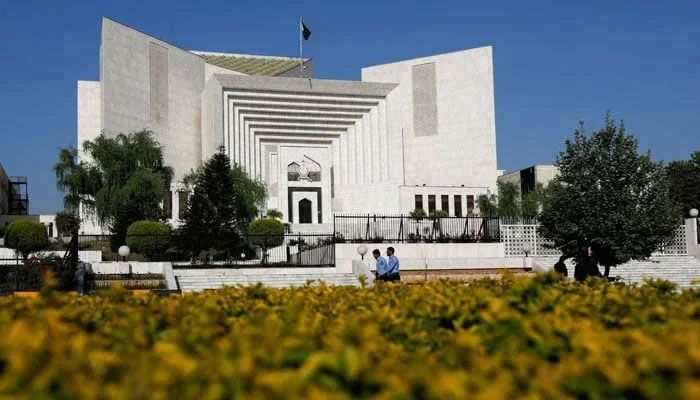Why APS case trial not conducted by military court, asks SC
Justice Mandokhail asks whether intent behind crime would be examined if crime was related to Army Act
ISLAMABAD: The Supreme Court was Wednesday was told that the trial of May 9 suspects would be held in the military courts as the offences fell under their jurisdiction.
A seven-member bench of the constitutional bench — headed by Justice Amin-ud-Din Khan — heard the Intra Court Appeals (ICAs) of the federal government as well as the Defence Ministry against the apex court’s judgment declaring the trial of civilians in military courts as unconstitutional. Advancing his arguments, Khwaja Haris, counsel for the Ministry of Defence, contended that the civilians’ trial would be held in the military courts, as the offences committed during the May 9 incidents fall under their jurisdiction. He contended that the nature of the crime determined whether the trial was to be held in a civilian or military court. He argued that if a civilian crime was linked to the armed forces, it fell within the jurisdiction of military courts. Justice Jamal Khan Mandokhail raised a question about the necessity of the 21st Amendment and told Haris that the amendment was made to try terrorists involved in attacking the Army Public School (APS). “Whether the Army Act did not exist at that time when the 21st Amendment was made?” Justice Mandokhail asked the counsel to which he replied yes. “Then why the Army Public School (APS) trial was not conducted in a military court despite the existence of the Army Act and the link of the crimes to it?” Justice Jamal Khan Mandokhail asked the counsel. Haris replied that the amendment included a wide range of crimes beyond those related to discipline and duties. Justice Mandokhail further inquired where would the trial of terrorist acts committed in the name of a terrorist group or religion be held. The defence ministry’s counsel replied that such cases would also be tried in military courts under the Army Act and there was no need for making any constitutional amendment in this regard.
Justice Mandokhail further asked whether the intent behind the crime would be examined if the crime was related to the Army Act. At this, Justice Amin-ud-Din Khan observed that the accused could raise a defence by arguing a lack of intent during the military trial. Justice Mandokhail recalled that Justice Hassan Azhar Rizvi had asked the other day as to why the cases related to attacks on GHQ and Karachi airbase were not conducted in the military courts. Haris replied those cases had been mentioned in the 21st Amendment. Justice Muhammad Ali Mazhar remarked that it would be examined as to what procedure was adopted during the military trials whether the accused were given the counsel of their choice and whether the evidences were produced during the trials. Justice Azhar Rizvi observed that at the time of passage of the 21st Amendment, former chairman Senate Mian Raza Rabbani was in tears. Justice Mandokhail, however, observed that Rabbani himself had admitted in the court that his hands were tied while voting in favour of the said amendment. “He could have refused to vote in favour of the 21st Amendment for which he only had to lose his seat in parliament,” Justice Mandokhail remarked.
Khwaja Haris submitted that he respected Rabbani who had rendered lots of services for parliament’s supremacy. Justice Mandokhail observed that Raza Rabbani was a man of principles who voted in favour of the 21st Amendment with tears in his eyes. Later, the court adjourned the hearing until (today) Thursday. Harris will continue his arguments.
-
 Ghost's Tobias Forge Makes Big Announcement After Concluding 'Skeletour World' Tour
Ghost's Tobias Forge Makes Big Announcement After Concluding 'Skeletour World' Tour -
 Katherine Short Became Vocal ‘mental Illness’ Advocate Years Before Death
Katherine Short Became Vocal ‘mental Illness’ Advocate Years Before Death -
 SK Hynix Unveils $15 Billion Semiconductor Facility Investment Plan In South Korea
SK Hynix Unveils $15 Billion Semiconductor Facility Investment Plan In South Korea -
 Buckingham Palace Shares Major Update After Meghan Markle, Harry Arrived In Jordan
Buckingham Palace Shares Major Update After Meghan Markle, Harry Arrived In Jordan -
 Demi Lovato Claims Fans Make Mental Health Struggle Easier
Demi Lovato Claims Fans Make Mental Health Struggle Easier -
 King Hospitalized In Spain, Royal Family Confirms
King Hospitalized In Spain, Royal Family Confirms -
 Japan Launches AI Robot Monk To Offer Spiritual Guidance
Japan Launches AI Robot Monk To Offer Spiritual Guidance -
 Japan Plans Missile Deployment Near Taiwan By 2031 Amid Growing Regional Tensions
Japan Plans Missile Deployment Near Taiwan By 2031 Amid Growing Regional Tensions -
 Meghan Markle, Prince Harry Spark Reactions With Latest Announcement
Meghan Markle, Prince Harry Spark Reactions With Latest Announcement -
 Kate Hudson Reflects On Handling Award Season With No Expectations
Kate Hudson Reflects On Handling Award Season With No Expectations -
 6 Celebrities Who Have Been Vocal About Anxiety And 'panic Attacks'
6 Celebrities Who Have Been Vocal About Anxiety And 'panic Attacks' -
 Is This The Future Of Train Travel? Robot Dogs, Drones Are Redefining Public Transit Safety Through China’s New Metro Station Deployment
Is This The Future Of Train Travel? Robot Dogs, Drones Are Redefining Public Transit Safety Through China’s New Metro Station Deployment -
 Sarah Ferguson Seeks Hollywood Backing As Epstein Files Resurface
Sarah Ferguson Seeks Hollywood Backing As Epstein Files Resurface -
 China’s AI Milestone: ByteDance’s Doubao Chatbot Hits 100M Users During Lunar New Year
China’s AI Milestone: ByteDance’s Doubao Chatbot Hits 100M Users During Lunar New Year -
 Think You Know ChatGPT? Here Are 5 AI Levels You’ve Never Seen
Think You Know ChatGPT? Here Are 5 AI Levels You’ve Never Seen -
 Bitcoin Bounces From $62,000 As On-chain Metrics Signal Prolonged Weakness: Here Is Everything To Know
Bitcoin Bounces From $62,000 As On-chain Metrics Signal Prolonged Weakness: Here Is Everything To Know




